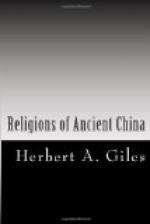In B.C. 523 there was a comet. A Minister said, “This broom-star sweeps away the old, and brings in the new. The doings of God are constantly attended by such appearances.”
Under B.C. 532 we have the record of a stone speaking. The Marquis of Lu enquired of his chief musician if this was a fact, and received the following answer: “Stones cannot speak. Perhaps this one was possessed by a spirit. If not, the people must have heard wrong. And yet it is said that when things are done out of season, and discontents and complaints are stirring among the people, then speechless things do speak.”
Human Sacrifices.—Human sacrifices appear to have been not altogether unknown. The Commentary tells us that in B.C. 637, in consequence of a failure to appear and enter into a covenant, the Viscount of Tseng was immolated by the people of the Chu State, to appease the wild tribes of the east. The Minister of War protested: “In ancient times the six domestic animals were not offered promiscuously in sacrifice; and for small matters, the regular sacrificial animals were not used. How then should we dare to offer up a man? Sacrifices are performed for the benefit of men, who thus as it were entertain the spirits. But if men sacrifice men, who will enjoy the offering?”
Again, in B.C. 529, the ruler of the Ch’u State destroyed the Ts’ai State, and offered up the heir apparent as a victim. An officer said, “This is inauspicious. If the five sacrificial animals may not be used promiscuously, how much less can a feudal prince be offered up?”
The custom of burying live persons with the dead was first practised in China in B.C. 580. It is said to have been suggested by an earlier and more harmless custom of placing straw and wooden effigies in the mausolea of the great. When the “First Emperor” died in B.C. 210, all those among his wives who had borne no children were buried alive with him.
Praying for Rain.—From another Commentary on the Spring and Autumn, by Ku-liang Shu, fourth century B.C., we have the following note on Prayers for Rain, which are still offered up on occasions of drought, but now generally through the medium of Taoist and Buddhist priests:—
“Prayers for rain should be offered up in spring and summer only; not in autumn and winter. Why not in autumn and winter? Perhaps the moisture of growing things is not then exhausted; neither has man reached the limit of his skill. Why in spring and summer? Because time is pressing and man’s skill is of no further avail. How so? Because without rain just then nothing could be made to grow; the crops would fail, and famine ensue. But why wait until time is pressing, and man’s skill of no further avail? Because to pray for rain is the same thing as asking a favour, and the ancients did not lightly ask favours. Why so? Because they held it more blessed to give than to receive; and as the latter excludes the former, the main object of man’s life is taken away. How is praying for rain asking a favour? It is a request that God will do something for us. The divine men of old who had any request to make to God were careful to prefer it in due season. At the head of all his high officers of State, the prince would proceed in person to offer up his prayer. He could not ask any one else to go as his proxy.”




